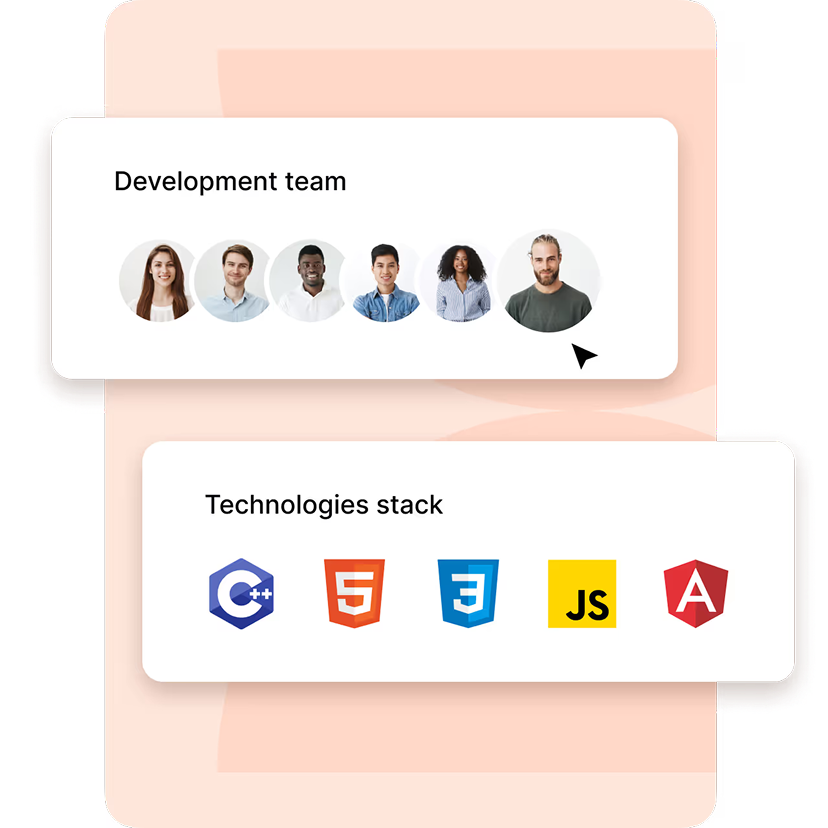Hire SQL Developers
Get a personalized demo now









SQL Developers are responsible for designing, creating, and maintaining databases, which are the backbone of data storage and retrieval in virtually every industry. They can create content management systems (CMS) for websites, e-commerce platforms for online stores, and financial management software for accounting.
The development of SQL stemmed from the need for a standardized method to interact with databases. SQL databases are highly scalable, capable of accommodating substantial data loads, making them suitable for applications of varying sizes and complexities.
An SQL Developer is a technical expert who designs, builds, and manages relational databases that power business applications. Their main responsibilities include crafting efficient SQL queries, maintaining database integrity, and optimizing how data is stored and accessed—ensuring your organization’s data backbone is both reliable and high-performing.
SQL developers play a pivotal role in your organization by handling a diverse set of critical tasks.
- Design and implement robust database schemas that support scalable, high-performing applications.
- Write and fine-tune SQL queries to ensure fast, accurate data retrieval and manipulation.
- Safeguard data integrity and enforce security protocols to protect sensitive information.
- Work closely with development teams to seamlessly integrate database functionality into software products.
- Perform ongoing database maintenance, including regular backups and disaster recovery planning.
- Identify and resolve database performance bottlenecks to keep systems running smoothly with minimal downtime.

SQL developers are essential professionals tasked with designing and maintaining relational databases, ensuring data integrity, optimizing query performance, enforcing security measures, and facilitating data integration, migration, and reporting. They play a critical role in structuring data efficiently, thus safeguarding its integrity.
SQL
Expertise in writing, modifying, and optimizing SQL queries for effective data manipulation and retrieval.
Database schemas
Designs logical and physical structures that organize and store data efficiently, laying the foundation for reliable databases.
SQL queries
Develops precise instructions to retrieve, update, or delete data, ensuring accuracy and performance in database operations.
Backup, recovery
Implements robust strategies to safeguard data and restore it quickly in the event of system failures.
Diagnosis
Pinpoints and troubleshoots issues that impact database performance, reliability, or security.
Data extraction
Efficiently extracts and transforms data for reporting, analytics, or migration, supporting business intelligence needs.
Job titles
Database Administrator
Database Developer
SQL Programmer
SQL Analyst
Data Engineer
Data Analyst
With thousands of professionals and technical experts it’ll be easier to look for a SQL developer that fits in your team.
While searching on Google, use Boolean operators like "AND," "OR," and "NOT" to refine your search. For example,
site:linkedin.com "SQL Developer" AND "Hibernate"
will show results related to SQL developers with experience in Hibernate framework.
Some of the most popular LinkedIn communities where you can find SQL developers are SQL Server Business Intelligence, SQL Learning Ggroup - LinkedIn Learning, SQL Server Administrators, Pl/Sql Developer Users, and SQL Server DBA Connect.
Explore the LinkedIn company pages of tech companies or startups that specialize in SQL development. These pages often feature employees' profiles, which can be a source of potential candidates. And thus help you find SQL developer with exceptional skills.
Online job boards
Post job openings on Indeed, LinkedIn, Naukri, Glassdoor, and Stack Overflow Jobs. Craft a clear and detailed job description that outlines the specific skills, experience, and qualifications you're looking for in a SQL developer. To attract the top talent, make sure your compensation package and benefits are competitive within the job market. Therefore, you can effectively leverage job posting platforms to find and hire SQL developer who is right for your team.
Developer communities and forums
When looking to hire a SQL developer, explore platforms like GitHub and Stack Overflow. Evaluate potential candidates by examining their projects. Consider the quality of their code, how much they contribute, and their overall activity. Seek out individuals with SQL developer skills that align with your project's needs. If your company has GitHub projects, showcase them to attract developers interested in your work.
Tech conferences and meetups
Attend SQL and related events to network with talented developers. By attending talks and discussions, you can gain insights into the interests and expertise of developers, helping you find candidates with exceptional SQL developer skills. Search for the upcoming regional or global React Js conferences online. Platforms like Eventbrite, Meetup, and Eventful allow you to search for and filter events. These events can be beneficial to hire SQL developer for your organization.
HackerEarth hiring challenges
Sponsor online coding challenges to find competitive developers. For instance HackerEarth organized the September SQL Challenge to look for talented SQL developer. These events can assist you in finding candidates with good SQL developer skills.
Open source communities
Engaging with active contributors in SQL-related open-source projects is a strategic approach to identify talented SQL developers. By participating in discussions, reporting issues, or even collaborating on these projects, you can discover individuals with a strong commitment to the SQL developer community. These contributors often maintain public repositories and share their SQL developer portfolios, showcasing their skills and expertise.
Online learning platforms
Connect with SQL enthusiasts on online learning platforms like Udemy and Coursera. Exploring the projects and assignments submitted by learners in these online courses can provide a glimpse into their practical skills and coding abilities. SQL enthusiasts often use these platforms to showcase their proficiency. You can also find links to their personal portfolios or GitHub repositories. Thus, it will be easier for you to discover talented individuals who are actively enhancing their SQL developer skills.
Local universities and coding boot camps
Collaborate with local academies and educational institutions to find aspiring SQL developers. For instance, you can partner with coding bootcamps that offer SQL courses. By engaging with instructors and students in these programs, you can identify promising talents who are eager to apply their newly acquired SQL developer skills to real-world projects.
Social media channels
Use platforms like Twitter, LinkedIn, and Facebook to share projects and job openings for SQL developers. Engage with SQL Developer communities such as SQL Server Community, by Microsoft. Actively participating in discussions and direct outreach to individuals can help you hire developers with the right skillset. Crafting engaging posts about your company's SQL initiatives and job opportunities can generate organic interest.
Referrals and employee networks
Promote employee referrals and leverage existing networks to gather recommendations in order to hire SQL developer with the right skillset.
Hire top tech talent withour recruitment platform
Access Free Demo👍 Pro tip
Reddit is a great place to look for various SQL-related communities, including r/SQL, r/learnSQL, r/PostgreSQL, r/SQLServer, r/mysql, etc. You can also join related communities on Discord and interact with thousands of members.
To hire an SQL Developer, the most common assessment framework on HackerEarth includes
A combination of technical evaluations, coding exercises, and behavioral assessments. Here are some common components of the assessment framework:
Code completion tasks
Integrating code completion tasks into the SQL developer hiring assessment will help in evaluating candidate's practical coding skills. You can include problems related to SQL syntax, indexing strategies, and query performance optimization. This approach ensures that you hire MS SQL developer with both the theoretical knowledge and practical skills. Code completion tasks can encompass challenges related to complex JOIN operations, and subquery usage. By incorporating these tasks, you can find SQL developer who not only understands SQL on a conceptual level but can also apply their skills to enhance the efficiency and reliability of database systems.
Multiple-choice questions (MCQs)
Leveraging MCQs in the hiring process for SQL developers provides a structured means of evaluating their theoretical knowledge and problem-solving abilities. Crafted thoughtfully, MCQs can assess a candidate's understanding of fundamental SQL concepts. By employing questions that mirror real-world scenarios, you can efficiently gauge their ability to apply SQL knowledge in practical situations. This is essential for tasks like designing efficient database schemas or troubleshooting performance issues. This approach streamlines the hiring process. And will help you hire SQL developer with a solid grasp of SQL fundamentals. You might also include questions related JOIN operations, subqueries, and transaction management. It will also ensure that the developers you hire not only has theoretical proficiency but also have the practical SQL developer skills as well.
Project-specific questions
Project-specific questions are pivotal in evaluating candidate's practical SQL developer skills. Tailoring questions to your project's requirements enables you to assess a candidate's proficiency in database design, optimization, and querying. This ensures that they can effectively navigate the intricacies of your SQL-based initiatives. For example, inquire about their experience in performance tuning for large datasets or their approach to database normalization for complex data structures. This focused approach ensures that the SQL developers you hire are not only well-versed in the language but also equipped to optimize databases.
Language-specific questions
When looking to hire SQL developer for your team, language-specific questions play a crucial role. They help in assessing a candidate's depth of understanding and practical SQL developer skills. For instance, you can ask questions related to SQL syntax, querying techniques, and database management principles. Asking about the differences between INNER and OUTER JOINs, or how they would optimize a slow-performing query, provides valuable insights into their problem-solving capabilities. Language-specific questions can also gauge a candidate's familiarity with advanced SQL features such as stored procedures, triggers, and transaction management.
Our bias-free, objective platform has facilitated 1,00,000+ assessments per month
Get a personalized demo nowCode completion task
- How do you select distinct values from a column in SQL?
- What is a primary key in SQL, and why is it important?
- What is SQL injection, and how can it be prevented?
- Write a SQL query to retrieve the top 5 highest-earning employees from a table named Salaries.
- Write a SQL query to find the total number of rows in a table named Orders.
Multiple-Choice Questions (MCQs)
- Which SQL statement is used to retrieve data from a database?
- SELECT
- UPDATE
- DELETE
- INSERT
- Which SQL clause is used to filter the result set by specifying a condition?
- FROM
- WHERE
- JOIN
- GROUP BY
- Which SQL data type is used to store text of variable length?
- INT
- VARCHAR
- DATE
- BOOLEAN
Questions related to Database Design
- Explain the difference between logical and physical database design.
- What is normalization in the context of database design? Why is it important?
- What is referential integrity, and why is it important in database design?
- How do you handle data consistency and integrity constraints in database design?
- What are composite keys, and when might you use them in database design?
NoSQL Database Questions
- What is a NoSQL database, and how does it differ from traditional relational databases?
- Describe the key characteristics of document-oriented databases. Provide an example of a document-oriented database.
- What is a graph database, and when is it suitable for data storage and retrieval?
- Describe the concept of indexing in NoSQL databases and its role in optimizing query performance.
- What are some popular NoSQL databases, and what programming languages are commonly used to interact with them?
👍 Pro tip
These sample questions provided here are for interviewing early-experience talents. For more customized assessments for candidates with higher experience, you can contact our team at contact@hackerearth.com or request a demo here.
Job title
An SQL developer job description should begin with a clear and concise job title that reflects the role, such as "Database Administrator", "Database Developer”, and “SQL Programmer”. Having a clear role can help you filter out candidates beforehand. And hence help you hire SQL developer whose tech stack aligns with your requirements.
Job summary
Provide a brief overview of the position, clarifying the key responsibilities and objectives. Describe what the user's primary focus is and how it contributes to the company's goals. Including a summary in the SQL developer job description can provide candidates with an overview of the role they are applying for.
Responsibilities
An SQL developer job description should outline the specific tasks and responsibilities that they will be expected to handle. This may include:
- Writing and optimizing SQL queries for data retrieval and manipulation
- Designing and maintaining database schemas
- Ensuring data integrity and enforcing constraints
- Collaborating with software developers to integrate database functionality into applications
- Implementing and managing database security, including user access control
It's an important part of the SQL developer job description. These key points will help developers understand the job requirements. Including these key points beforehand can also help you filter out candidates. And thus help you hire MS SQL developer with the right skillset.
SQL Developer Skills and Qualifications
List the essential SQL developer skills and qualifications that candidates must possess, including, but not restricted to:
- Proficiency in SQL, including querying, data manipulation, and schema design
- Knowledge of relational database management systems (RDBMS) such as MySQL, PostgreSQL, SQL Server, Oracle, etc.
- Ability to write efficient SQL queries and optimize query performance
- Familiarity with database indexing, stored procedures, and triggers
- Competence in working with data modeling and database design
- Knowledge of NoSQL databases (e.g., MongoDB, Cassandra) may be relevant in some cases
Mentioning the required SQL developer skills can help candidates understand the role they are applying for. As a result you can find and hire SQL developer with the right skillset.
Preferred skills
Mention any additional SQL developer skills or qualifications that would be beneficial but not mandatory for the role. It might attract candidates with broader skillset and thus help you hire MS SQL developer with exceptional skills. You can also ask for experience with specific tools, libraries, or domains.
Education and experience
Specify the educational background and professional experience required for the position. This could range from a bachelor's degree in computer science or a related field to several years of relevant experience. Mentioning these prerequisites can help you filter out the candidates beforehand. And thus help you hire SQL developer with the qualifications you are looking for.
Company culture and EVPs
Briefly highlight your company's culture, values, and any unique perks or benefits offered to employees that can help attract candidates who align with your company's ethos.
Application instructions
Provide instructions on how candidates can apply for the position. Include where to send their resume, portfolio, or other required documents. Also, specify the deadline for applications, if applicable. It's another crucial point to be included in the SQL developer job description.
Equal Opportunity Statement
Include a statement affirming that your company is an equal opportunity employer committed to diversity and inclusion.
Skill-first hiring requires that the developer interview process be designed to understand the candidate’s skill and experience in the given domain. You can consider the following guidelines when conducting a face-to-face interview with an SQL developer:
Conduct a real-time technical assessment
During the SQL developer hiring assessment process, candidates are usually given a task to complete beforehand. However, using the interview platform to assess skills in real time will tell you a lot about the candidate’s communication skills and thought process.
FaceCode is HackerEarth’s flagship tech interview platform with a built-in question library you can use to test the candidate’s knowledge of SQL. The built-in IDE environment can be used for assessing their ability to write clean, efficient, and maintainable code. You can also use the pair-programming method to observe their problem-solving approach, logical thinking, and attention to detail.
Learn how Facecode can make tech interviews easier
Understand the candidate’s project experience and review the portfolio
During the SQL developer interview assessment, explore the candidate's past and present projects. Focus on their personal contributions and the skills they used. Ask them to discuss an SQL project, detailing their responsibilities, problem-solving, and collaboration. If available, review their portfolio or code samples for coding style, documentation, and project quality.
Understand if they are a good culture and team fit
Another crucial aspect to check during the Swift developer interview assessment is if they align with your organization's values. While technical skills are essential for a developer, the significance of cultural fit should not be overlooked. The ideal candidate must possess not only accurate coding abilities but also effective communication and collaboration skills to thrive in agile and collaborative environments. Evaluating a candidate's capability to work both independently and collaboratively in a team is crucial. This assessment provides valuable insights into the candidate's problem-solving skills, communication, and adaptability, helping to determine their fit for the role and the team dynamics.
Additionally, this evaluation offers engineering managers a chance to exhibit their team culture and values, enabling them to find a candidate who aligns well with the team's ethos.
United States
Salaries are highest in major cities and for developers with advanced SQL skills, particularly in industries such as financial services, healthcare, and consulting.
- Average Annual Salary: $101,000–$122,695 per year (Glassdoor, 2025)
- Entry-Level: $74,967–$87,379 per year
- Mid-Level: $101,494–$110,032 per year
- Senior-Level: $114,747–$130,753+ per year
United Kingdom
London and other major cities offer higher salaries, particularly for senior roles or those with advanced SQL and enterprise database expertise
- Median Annual Salary: £57,500 per year (national median)
- London Average: £54,284 per year (Glassdoor, 2025)
- Entry-Level: £25,000–£42,500 per year
- Mid-Level: £56,506–£69,500 per year
- Senior-Level: £70,000–£75,000+ per year
Australia
Salaries are highest in Sydney and Melbourne, with top pay for experienced and senior developers, particularly in organizations focusing on performance-critical or enterprise applications.
- Average Annual Salary: A$113,750–A$132,500 per year (Glassdoor, 2025)
- Entry-Level: A$90,000–A$113,750 per year
- Mid-Level: A$113,750–A$132,500 per year
- Senior-Level: A$132,500–A$156,250+ per year
What qualifications should I look for in an SQL developer?
An SQL developer should possess a strong technical skill set, including proficiency in SQL, database management systems, data modeling, and performance optimization. They should have practical experience in SQL development, and familiarity with scripting languages like Python or Java.
Soft skills like problem-solving, attention to detail, effective communication, and adaptability are also crucial. Having certifications can be a plus but always look for candidates with a good project portfolio and industry experience.
Do we require the candidate to have experience in all the necessary frameworks or just one is enough?
SQL developers need to have the framework based on the type of job they are pursuing. For instance and .NET developers may focus on Entity Framework or Dapper. Similarly Java developers might opt for Hibernate or JDBC, and Python developers commonly use SQLAlchemy or psycopg2.
You should also look for SQL developers that are highly adaptive and keen to learn new frameworks and technologies.
What are the skillsets of a Database Administrator?
Core skills include expertise in database management systems (DBMS) such as MySQL, Oracle, SQL Server, or PostgreSQL. DBAs should be proficient in database design, schema optimization, and query performance tuning to ensure efficient data storage and retrieval. They need a deep understanding of database security and access control to protect sensitive data and comply with regulations.
DBAs often work with scripting languages for automation tasks and should be familiar with SQL and PL/SQL for managing and querying databases. Effective communication, teamwork, and adaptability are also vital for collaborating with developers.
How to assess a candidate's real-world project-handling skills?
Request the candidate to provide examples of projects they've worked on, highlighting their role, responsibilities, and the outcomes achieved. Additionally, present the candidate with hypothetical real-world scenarios relevant to the job, such as a database migration and ask how they would approach and solve these issues. It will allow you to evaluate their problem-solving abilities.
How does the requirement of SQL skills vary in the industry?
Roles like database administrators (DBAs) and SQL developers typically demand a high level of SQL expertise. It includes proficiency in writing complex queries, optimizing database performance, and managing database schemas. Data analysts and business intelligence professionals often require SQL skills for data extraction and analysis. In contrast, software developers may need SQL for database interaction but may prioritize other programming skills more heavily.





.webp)
.webp)
.webp)
.webp)
.webp)
.webp)

.webp)
.webp)





.webp)


.webp)












